Abstract
1,3-Butadiene, a large-production volume chemical used mainly in the manufacture of synthetic rubber, was found to induce multiple-organ carcinogenicity in male and female B6C3F1 mice at exposure concentrations (625 and 1250 ppm) equivalent to and below the OSHA standard of 1000 ppm. Since this study was terminated after 60 weeks of exposure because of reduced survival due to fatal tumors, and because dose-response relationships for 1,3-butadiene-induced neoplastic and nonneoplastic lesions were not clearly established, a second long-term inhalation study of 1,3-butadiene in B6C3F1 mice was conducted at lower exposure concentrations, ranging from 6.25 to 625 ppm. Both the histopathological findings from animals dying through week 65 and the results of evaluations of animals exposed for 40 and 65 weeks are presented in this report. Exposure to 1,3-butadiene caused a regenerative anemia at concentrations of 62.5 ppm and higher. Testicular atrophy was induced at 625 ppm, and ovarian atrophy was observed at 20 ppm and higher. During the first 50 weeks of the study, lymphocytic lymphoma was the major cause of death of mice exposed to 625 ppm 1,3-butadiene. Neoplasms of the heart, forestomach, lung, Harderian gland, mammary gland, ovary, and liver were frequently observed in 1,3-butadiene-exposed mice that died between week 40 and week 65 of the study. Studies in which exposure to 1,3-butadiene was stopped after limited periods were also included to assess the relationship between exposure levels and duration of exposures on the outcome of 1,3-butadiene-induced carcinogenicity. In these studies, lymphocytic lymphomas were induced in male mice exposed to 625 ppm 1,3-butadiene for only 13 weeks. The incidence of lymphocytic lymphoma in male mice exposed to 625 ppm 1,3-butadiene for 26 weeks was two times that in mice exposed to 625 ppm for 13 weeks. However, when the exposure concentration was reduced by half to 312 ppm and the exposure duration extended to 52 weeks, the incidence of lymphocytic lymphoma was reduced by 90%. Thus, the multiple of the exposure concentration times the exposure duration did not predict the incidence of lymphocytic lymphoma in mice. The early mortalities resulting from lymphocytic lymphomas in male mice exposed to 625 ppm 1,3-butadiene limited the expression of tumors at other sites. A clearer dose-response for 1,3-butadiene-induced neoplasia should be apparent from experiments in mice exposed to lower concentrations of this chemical for 2 years.
Full text
PDF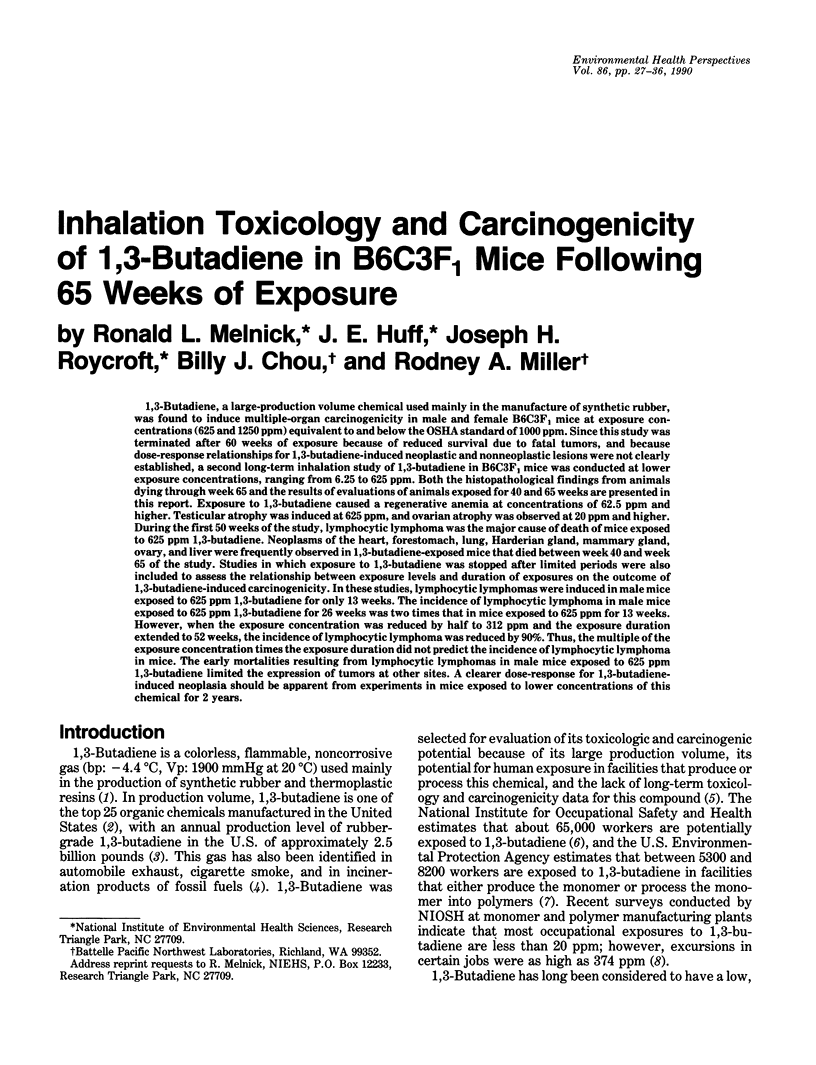
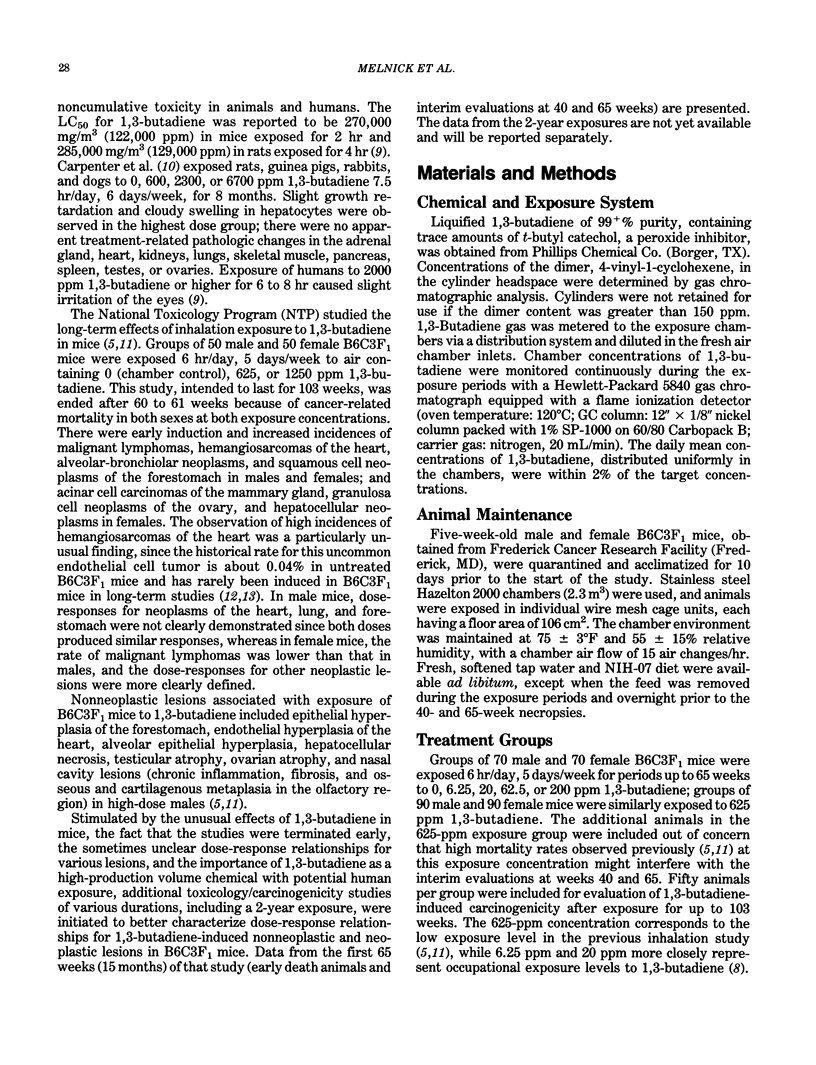
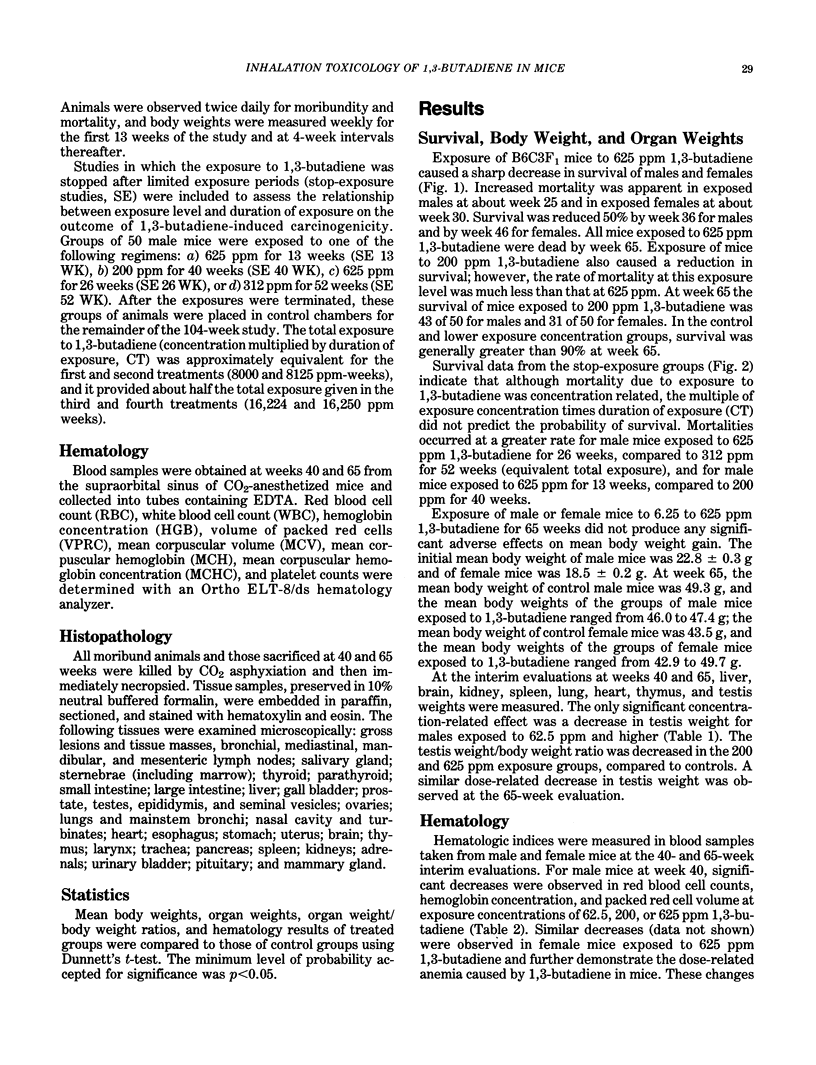
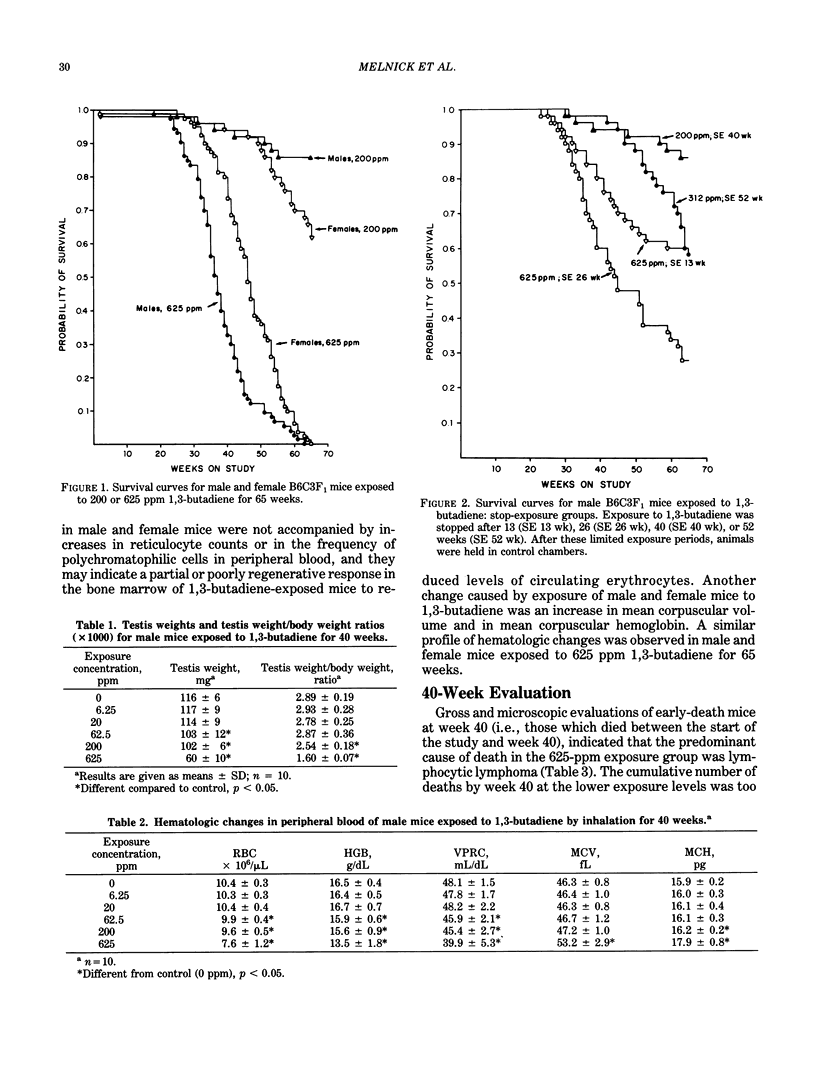
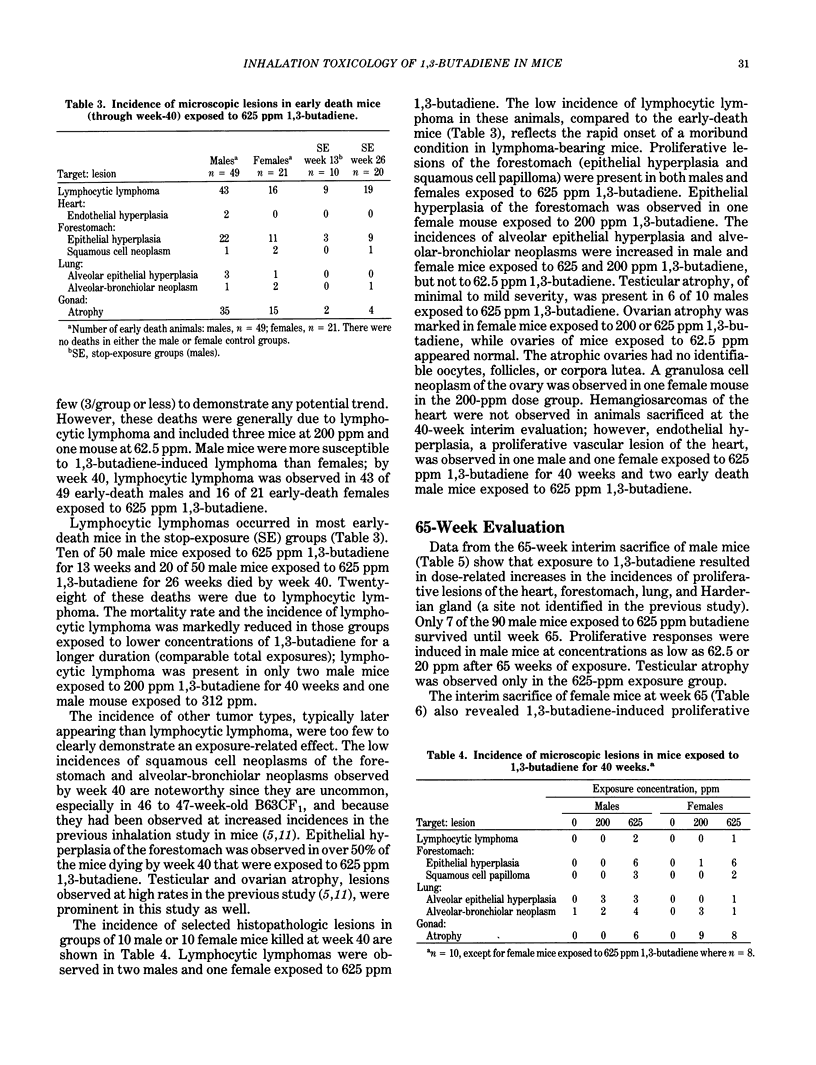
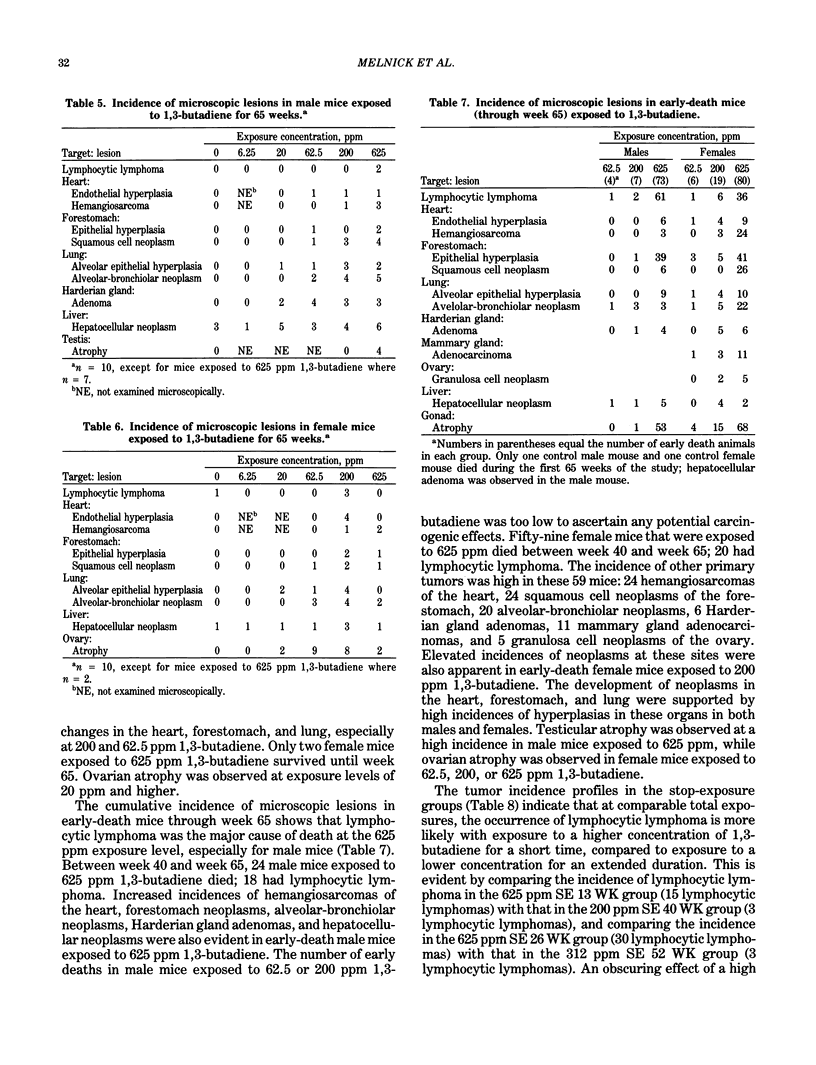
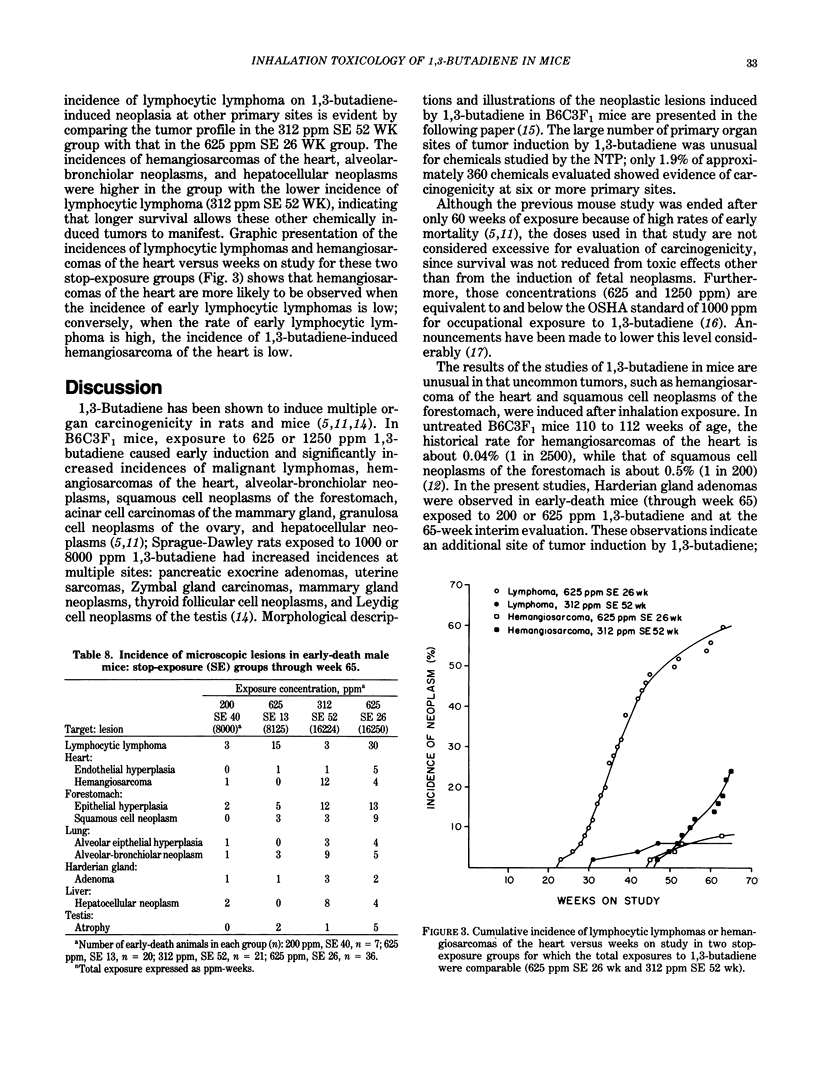
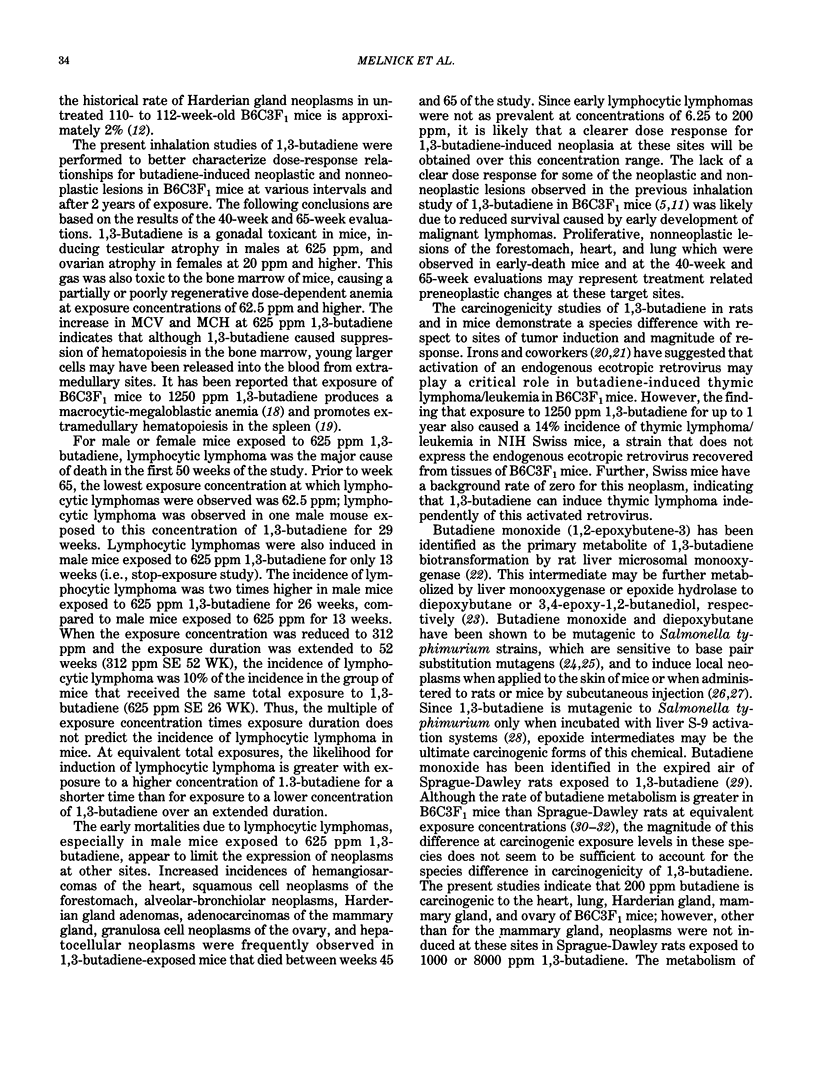
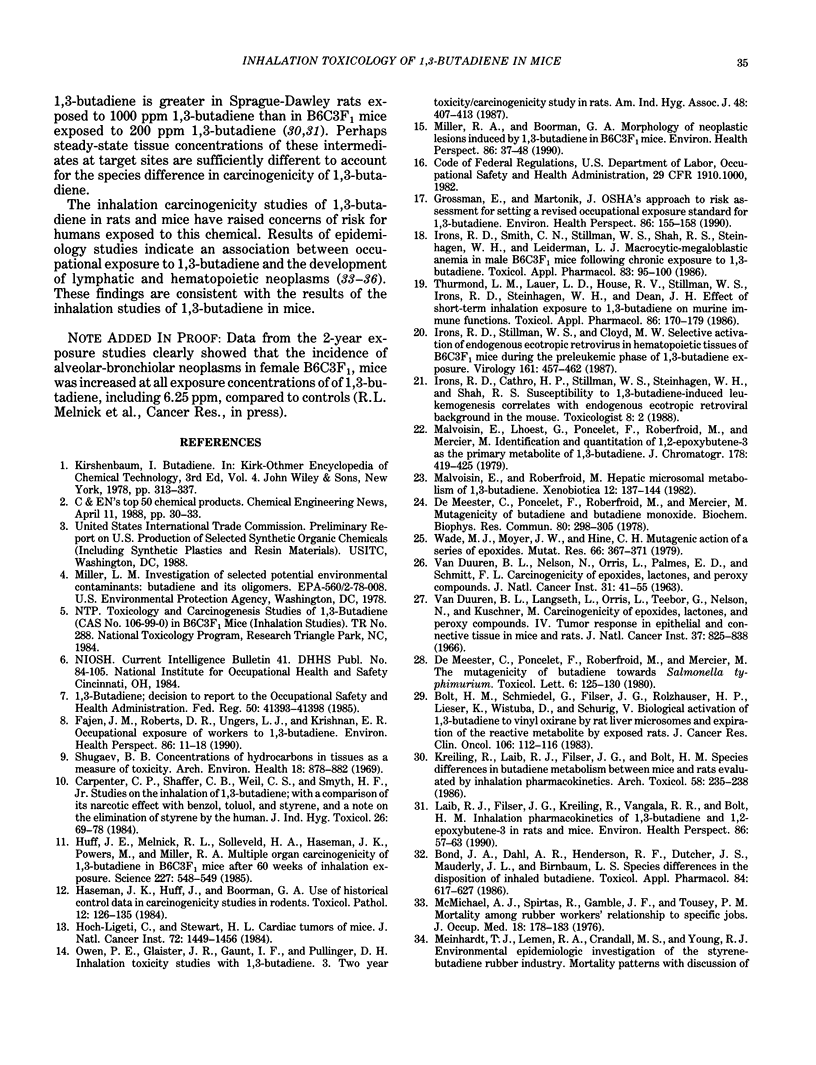

Selected References
These references are in PubMed. This may not be the complete list of references from this article.
- Bolt H. M., Schmiedel G., Filser J. G., Rolzhäuser H. P., Lieser K., Wistuba D., Schurig V. Biological activation of 1,3-butadiene to vinyl oxirane by rat liver microsomes and expiration of the reactive metabolite by exposed rats. J Cancer Res Clin Oncol. 1983;106(2):112–116. doi: 10.1007/BF00395388. [DOI] [PMC free article] [PubMed] [Google Scholar]
- Bond J. A., Dahl A. R., Henderson R. F., Dutcher J. S., Mauderly J. L., Birnbaum L. S. Species differences in the disposition of inhaled butadiene. Toxicol Appl Pharmacol. 1986 Jul;84(3):617–627. doi: 10.1016/0041-008x(86)90268-1. [DOI] [PubMed] [Google Scholar]
- Downs T. D., Crane M. M., Kim K. W. Mortality among workers at a butadiene facility. Am J Ind Med. 1987;12(3):311–329. doi: 10.1002/ajim.4700120307. [DOI] [PubMed] [Google Scholar]
- Fajen J. M., Roberts D. R., Ungers L. J., Krishnan E. R. Occupational exposure of workers to 1,3-butadiene. Environ Health Perspect. 1990 Jun;86:11–18. doi: 10.1289/ehp.908611. [DOI] [PMC free article] [PubMed] [Google Scholar]
- Grossman E. A., Martonik J. OSHA's approach to risk assessment for setting a revised occupational exposure standard for 1,3-butadiene. Environ Health Perspect. 1990 Jun;86:155–158. doi: 10.1289/ehp.9086155. [DOI] [PMC free article] [PubMed] [Google Scholar]
- Haseman J. K., Huff J., Boorman G. A. Use of historical control data in carcinogenicity studies in rodents. Toxicol Pathol. 1984;12(2):126–135. doi: 10.1177/019262338401200203. [DOI] [PubMed] [Google Scholar]
- Hoch-Ligeti C., Stewart H. L. Cardiac tumors of mice. J Natl Cancer Inst. 1984 Jun;72(6):1449–1456. [PubMed] [Google Scholar]
- Huff J. E., Melnick R. L., Solleveld H. A., Haseman J. K., Powers M., Miller R. A. Multiple organ carcinogenicity of 1,3-butadiene in B6C3F1 mice after 60 weeks of inhalation exposure. Science. 1985 Feb 1;227(4686):548–549. doi: 10.1126/science.3966163. [DOI] [PubMed] [Google Scholar]
- Irons R. D., Smith C. N., Stillman W. S., Shah R. S., Steinhagen W. H., Leiderman L. J. Macrocytic-megaloblastic anemia in male B6C3F1 mice following chronic exposure to 1,3-butadiene. Toxicol Appl Pharmacol. 1986 Mar 30;83(1):95–100. doi: 10.1016/0041-008x(86)90326-1. [DOI] [PubMed] [Google Scholar]
- Irons R. D., Stillman W. S., Cloyd M. W. Selective activation of endogenous ecotropic retrovirus in hematopoietic tissues of B6C3F1 mice during the preleukemic phase of 1,3-butadiene exposure. Virology. 1987 Dec;161(2):457–462. doi: 10.1016/0042-6822(87)90139-5. [DOI] [PubMed] [Google Scholar]
- Kreiling R., Laib R. J., Filser J. G., Bolt H. M. Species differences in butadiene metabolism between mice and rats evaluated by inhalation pharmacokinetics. Arch Toxicol. 1986 Apr;58(4):235–238. doi: 10.1007/BF00297112. [DOI] [PubMed] [Google Scholar]
- Laib R. J., Filser J. G., Kreiling R., Vangala R. R., Bolt H. M. Inhalation pharmacokinetics of 1,3-butadiene and 1,2-epoxybutene-3 in rats and mice. Environ Health Perspect. 1990 Jun;86:57–63. doi: 10.1289/ehp.908657. [DOI] [PMC free article] [PubMed] [Google Scholar]
- Malvoisin E., Roberfroid M. Hepatic microsomal metabolism of 1,3-butadiene. Xenobiotica. 1982 Feb;12(2):137–144. doi: 10.3109/00498258209046787. [DOI] [PubMed] [Google Scholar]
- Matanoski G. M., Santos-Burgoa C., Schwartz L. Mortality of a cohort of workers in the styrene-butadiene polymer manufacturing industry (1943-1982). Environ Health Perspect. 1990 Jun;86:107–117. doi: 10.1289/ehp.9086107. [DOI] [PMC free article] [PubMed] [Google Scholar]
- McMichael A. J., Spirtas R., Gamble J. F., Tousey P. M. Mortality among rubber workers: Relationship to specific jobs. J Occup Med. 1976 Mar;18(3):178–185. doi: 10.1097/00043764-197603000-00012. [DOI] [PubMed] [Google Scholar]
- Miller R. A., Boorman G. A. Morphology of neoplastic lesions induced by 1,3-butadiene in B6C3F1 mice. Environ Health Perspect. 1990 Jun;86:37–48. doi: 10.1289/ehp.908637. [DOI] [PMC free article] [PubMed] [Google Scholar]
- Owen P. E., Glaister J. R., Gaunt I. F., Pullinger D. H. Inhalation toxicity studies with 1,3-butadiene. 3. Two year toxicity/carcinogenicity study in rats. Am Ind Hyg Assoc J. 1987 May;48(5):407–413. doi: 10.1080/15298668791384959. [DOI] [PubMed] [Google Scholar]
- Shugaev B. B. Concentrations of hydrocarbons in tissues as a measure of toxicity. Arch Environ Health. 1969 Jun;18(6):878–882. doi: 10.1080/00039896.1969.10665509. [DOI] [PubMed] [Google Scholar]
- Thurmond L. M., Lauer L. D., House R. V., Stillman W. S., Irons R. D., Steinhagen W. H., Dean J. H. Effect of short-term inhalation exposure to 1,3-butadiene on murine immune functions. Toxicol Appl Pharmacol. 1986 Nov;86(2):170–179. doi: 10.1016/0041-008x(86)90047-5. [DOI] [PubMed] [Google Scholar]
- VANDUUREN B. L., NELSON N., ORRIS L., PALMES E. D., SCHMITT F. L. CARCINOGENICITY OF EPOXIDES, LACTONES, AND PEROXY COMPOUNDS. J Natl Cancer Inst. 1963 Jul;31:41–55. [PubMed] [Google Scholar]
- Van Duuren B. L., Langseth L., Orris L., Teebor G., Nelson N., Kuschner M. Carcinogenicity of epoxides, lactones, and peroxy compounds. IV. Tumor response in epithelial and connective tissue in mice and rats. J Natl Cancer Inst. 1966 Dec;37(6):825–838. [PubMed] [Google Scholar]
- Wade M. J., Moyer J. W., Hine C. H. Mutagenic action of a series of epoxides. Mutat Res. 1979 Apr;66(4):367–371. doi: 10.1016/0165-1218(79)90047-8. [DOI] [PubMed] [Google Scholar]
- de Meester C., Poncelet F., Roberfroid M., Mercier M. Mutagenicity of butadiene and butadiene monoxide. Biochem Biophys Res Commun. 1978 Jan 30;80(2):298–305. doi: 10.1016/0006-291x(78)90676-9. [DOI] [PubMed] [Google Scholar]
- de Meester C., Poncelet F., Roberfroid M., Mercier M. The mutagenicity of butadiene towards Salmonella typhimurium. Toxicol Lett. 1980 Aug;6(3):125–130. doi: 10.1016/0378-4274(80)90179-4. [DOI] [PubMed] [Google Scholar]


